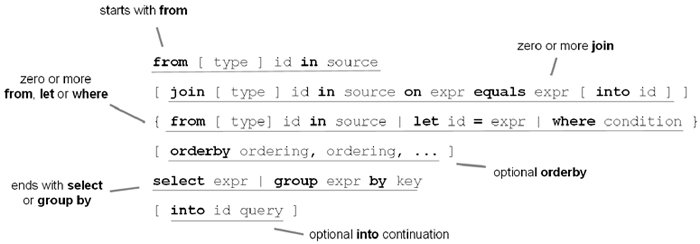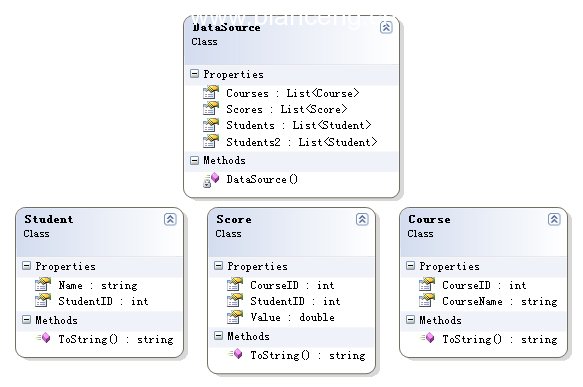Linq 語法結構

(來自Linq in action)
舉個例子實現:
查詢以a開頭的字符串,按降序輸出。
C#代碼:
string[] list = { "adobe", "excel", "acer", "query", "async", "xianfen", "apple", "amazon", "player", "best", "wow" };
var result = from word in list
where word.StartsWith("a")
orderby word descending
select word;
result.ToList().ForEach(str => Console.WriteLine(str));
// 輸出:
// async
// apple
// amazon
// adobe
// acer
等價的面向對象語法為:
var result = list.Where(str => str.StartsWith("a"))
.OrderByDescending(str => { return str; });
這裡 Where 和 OrderByDescending都是IEnumerable<T>的擴展方法,因為數組類型實現了該接口,所以可以直接調用這些這些擴展方法。
這些擴展方法的實現是在Enumerable類型中實現的,因此,更直接的是調用Enumerable類型的靜態方法方法:
var result =
Enumerable.OrderByDescending(
Enumerable.Where(
list, str => str.StartsWith("a")), str => { return str; }
);
從這些逆向演化可以看出,查詢語法就是一種"語法糖"。前面提到過,編譯後運行時版本還是2.0,從這可以看出一些端倪。如果想繼續深入了解該實現可以用ILDASM查看IL源代碼和反射類庫源代碼。
result類型為IEnumerable<TElement>或派生自IEnumerable<TElement>接口的類型。
與 Linq 相關的程序集
System.Linq 命名空間在System.Core.dll中,接口類型及擴展方法的定義在該命名空間中,如:
Enumerable
IGrouping<TKey, TElement>
ILookup<TKey, TElement>
IQueryable<T>
IOrderedQueryable<T>
Expressions
...
System.Data.DataSetExtensions.dll 包含 Linq to DataSet 的相關類型的定義。
System.Data.Linq.dll 包含 Linq to SQL 的相關類型的定義。
System.Xml.Linq.dll 包含 Linq to XML 的相關類型的定義。
全程數據
為了下面介紹方便,構造以下,
數據結構圖如下:

數據定義如下:
public class Student
{
public int StudentID { get; set; }
public string Name { get; set; }
override public string ToString()
{
return string.Format("Student ID:{0},Student Name:{1}", StudentID, Name);
}
}
public class Course
{
public int CourseID { get; set; }
public string CourseName { get; set; }
override public string ToString()
{
return string.Format("Course ID:{0},Course Name:{1}", CourseID, CourseName);
}
}
public class Score
{
public int StudentID { get; set; }
public int CourseID { get; set; }
public double Value { get; set; }
override public string ToString()
{
return string.Format("Student ID:{0},Course ID:{1},Score:{2}", StudentID, CourseID, Value);
}
}
public class DataSource
{
public static List<Student> Students { get; private set; }
public static List<Student> Students2 { get; private set; }
public static List<Score> Scores { get; private set; }
public static List<Course> Courses { get; private set; }
static DataSource()
{
Students = new List<Student>
{
new Student{ StudentID=1, Name="Andy" },
new Student{ StudentID=2, Name="Bill" },
new Student{ StudentID=3, Name="Cindy" },
new Student{ StudentID=4, Name="Dark" }
};
Students2 = new List<Student>
{
new Student{ StudentID=5, Name="Erik" },
new Student{ StudentID=6, Name="Frank" }
};
Courses = new List<Course>
{
new Course { CourseID = 1, CourseName = "C Language" },
new Course { CourseID = 2, CourseName = "Biophysics" },
new Course { CourseID = 3, CourseName = "Fundamentals of Compiling" },
new Course { CourseID = 4, CourseName = "Finance" },
new Course { CourseID = 5, CourseName = "College English" }
};
Scores = new List<Score>
{
new Score { StudentID = 1, CourseID = 1, Value = 78 },
new Score { StudentID = 1, CourseID = 2, Value = 60 },
new Score { StudentID = 1, CourseID = 3, Value = 92 },
new Score { StudentID = 1, CourseID = 4, Value = 85 },
new Score { StudentID = 1, CourseID = 5, Value = 55.5 },
new Score { StudentID = 2, CourseID = 1, Value = 59 },
new Score { StudentID = 2, CourseID = 2, Value = 78 },
new Score { StudentID = 2, CourseID = 3, Value = 86 },
new Score { StudentID = 3, CourseID = 2, Value = 60 },
new Score { StudentID = 4, CourseID = 4, Value = 96 },
new Score { StudentID = 5, CourseID = 5, Value = 78 }
};
}
}
後續知識點將使用這裡定義的數據進行解析。